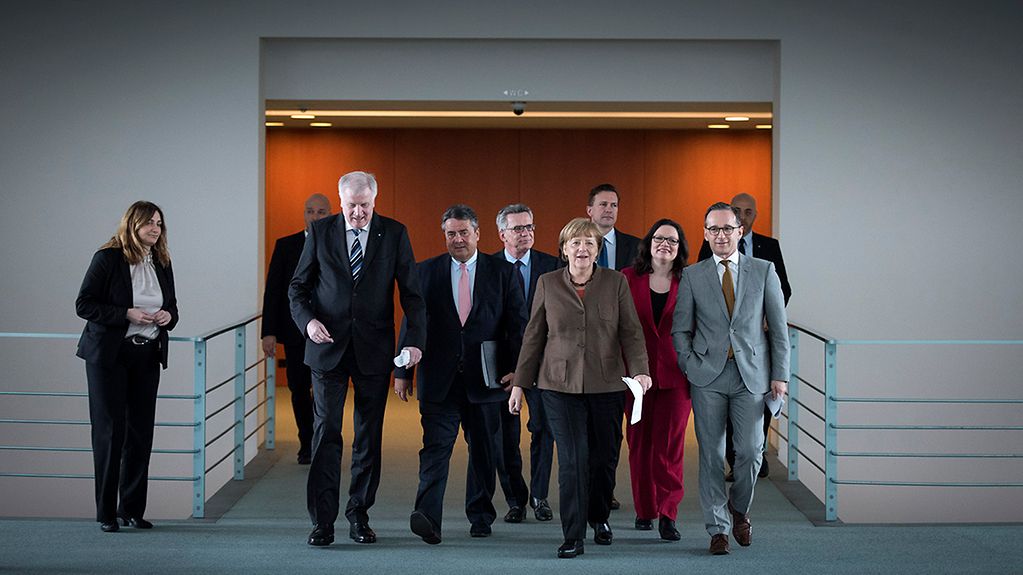Coalition Committee
The governing coalition has agreed on packages of integration and anti-terrorism measures, as well as other legislative proposals. Chancellor Angela Merkel considers that the agreement on an Integration Act marks a major achievement in the refugee debate.
5 min reading time

Coalition leaders have agreed on an Integration Act
Photo: Bundesregierung/Bergmann
For the first time in the history of the Federal Republic of Germany there is to be a federal law on integration, announced Chancellor Angela Merkel in Berlin at a joint press conference with Vice-Chancellor Sigmar Gabriel and CSU leader Horst Seehofer at the Federal Chancellery. The fact that the federal government sees this as its duty is progress, she said. She said the agreement was a two-way process that would foster integration while expecting incomers to do their bit.
Integration Act to introduce a two-way process
The Chancellor stressed that the new law will embrace services offered to refugees, but equally duties of the refugees themselves in the integration process. There are plans to facilitate access to training and the job market. There are also to be more assisted jobs and improved access to integration courses. The duties of refugees with respect to integration are also to be laid out; failure to comply with these duties will lead to cuts in welfare benefits.
The German government plans to put in place reliable service offerings for refugees with the Integration Act, explained Angela Merkel. The core is "to attempt to integrate as many people as possible into the labour market". It is crucial that refugees learn German and that they are trained. The planned new law is intended to facilitate access to training for people with good prospects of being able to stay in Germany, and orientation courses for those whose prospects are less good. Not everybody can stay in Germany, stressed the Chancellor. But it will be damaging, "if people are offered nothing for the first year and a half".
Angela Merkel stressed that the new law will create legal certainty for refugees and companies alike. But, she added, "Anybody dropping out of training will lose their residence permit." For a period of three years, the process of ascertaining whether a German or EU citizen is not available who could take the job is to be suspended for asylum-seekers. Currently the Federal Employment Agency must run this check before a non-EU citizen can take up employment. During their training, individuals will have a tolerated residence status, which will be extended for six months to enable them to seek employment on successful completion of their training. If a company takes on the trainee, he or she will be given a two-year residence permit.
Strengthening refugee ID, allocating refugees more equitably across the country
Federal Minister for Economic Affairs Sigmar Gabriel said that the planned Integration Act was a "historic step". It will make it clear to immigrants to Germany that it is worth making an effort. Sigmar Gabriel stressed that Germany does not aim to assimilate by force. But, he said, people who want to belong here, will have to do their bit. Integration is hard work and a lot is expected – of migrants, society as a whole and the state.
The governing coalition also agreed to ramp up the importance of the refugee identity card. In future it is to be a prerequisite for access to the labour market and to integration benefits. And the coalition was in agreement that incomers should be more equitably distributed across Germany in order to prevent the emergence of social hotspots.
Expanding counter-terrorism
The Chancellor singled out two points with respect to counter-terrorism measures. The security authorities are to be strengthened and private companies required to do more to help combat terrorism. Vice-Chancellor Sigmar Gabriel added, "If we want to live in security we cannot afford to leave those who jeopardise our security unobserved. Internal security protects liberty in Germany."
The coalition agreed at its meeting to extend the preventive investigative authority of the federal police force. This is to be ensured through the use of undercover agents to avert dangers and not only for purposes of bringing prosecutions. A special spotlight will be on crimes involving human traffickers. Security authorities are to be enabled to search the stock data of telecommunication firms using automatic techniques also with incomplete names and variations in spelling.
Cooperation with foreign intelligence agencies is to be developed. In international cooperation, the availability of information and analytical capacities are to be stepped up. In future to buy prepaid mobile phones too, purchasers will have to present proof of identity bearing their full address. The coalition also aims to ensure that the joint data of intelligence services and the police can be used as an analytical tool.
It was also announced that the measured needed to implement the EU’s framework decision on terrorism will be submitted to Cabinet before parliament’s summer recess.
Pensions dialogue in preparation
Angela Merkel announced that the governing coalition had agreed to pass on to the federal ministries for consultation the legislative proposal of Andrea Nahles, Federal Minister of Labour, to address the abuse of temporary and contract workers. The aim is, explained Sigmar Gabriel, to make it clear that good work must be rewarded with job security and fair wages – both during working life and in terms of pensions.
With regard to pensions, there is to be a dialogue with employers and trade unions. The need to tackle poverty in old age is a major issue, underscored the Chancellor. Sigmar Gabriel guaranteed that the agreements laid out in the coalition agreement regarding a solidarity pension for lifetime achievement and reform of company pensions will be honoured. Horst Seehofer, Bavarian State Premier, pointed out that the dialogue mentioned by the Chancellor would focus mainly on future pensions. There is a broad consensus within society, he said, that action is needed in this context.